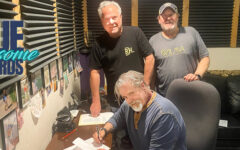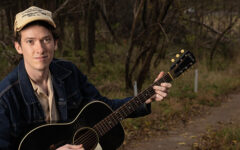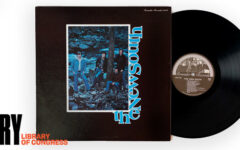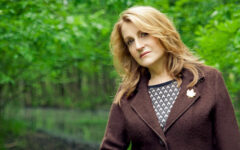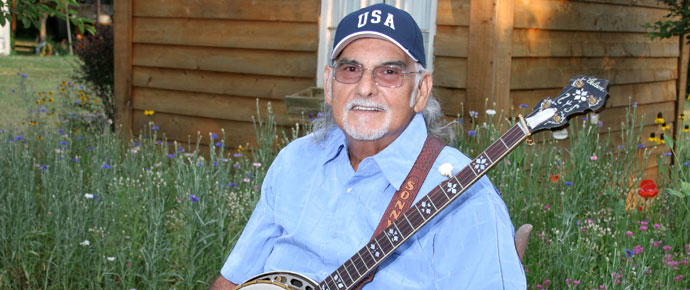
Ask Sonny Anything is a recurring feature where our readers pose questions to the great Sonny Osborne, one half of the iconic Osborne Brothers who redefined bluegrass music in the 1960s, and noted banjo maven and collector of fine prewar instruments. Everyone is encouraged to pose queries of your own each week in the comments, about his history in the music, his wealth of banjo knowledge, or regarding any life advice you might be needing.
Sonny,
Thank you so much for this column, it’s my absolute favorite and I simply cannot wait until Fridays to see what you have to say. My question is simple, I haven’t heard you speak much here about the Stanley Brothers, but certainly your paths must have crossed many times. So I’m curious if you could share some thoughts. Were you friends or rivals?
Alan P
……Alan you raise a strong subject. I’ll do my best. The Stanley Brothers. Our relationship was friendly (Bobby worked with them a few weeks before he became A UNITED STATES MARINE) Yep, he became a bad ass…when he got back from Korea he was one of the two toughest men I ever knew. He wouldn’t give none, but he wouldn’t take none. The other was M.C. Dixon. Mother’s brother. Second world war PARATROOPER. Good guy. Picked the Guitar like Merle Travis.
I digress… back to the Stanley Brothers. Strange men. I really liked Carter’s songwriting.
Ralph Mayo was a good fiddle player who worked with them. After we came to Nashville we worked with them in Ohio, and they told us that Ralph Mayo had died. Horrible death. I mean man, it messed with me. I liked Ralph Mayo. We talked some. Nice man. Funny looking… he had ears that stuck out like a 34 Ford with suicide doors. The ones that opened backward..you know!
About two weeks after they told us that we were playing in Kingsport, Tennessee, on stage. I happened to notice a man coming in the auditorium and the lights from outside the room gave him a shadow appearance and this guy had Ralph Mayo ears. Bobby was at the mic singing and I walked over behind him and said to look at the guy just coming in. Right in the middle of a verse he looked and said: “By God, that’s Ralph Mayo!” He was within sight by this time and when Bobby said that he looked up. Sure enough, it was Ralph Mayo. Two weeks after Carter and Ralph had told us of his horrible death.
Suffered terrible right up to the end. Strange men. I’ll tell more when someone asks me!
s
—–
Sonny, You mentioned studying Rudy Lyle. Your ear on one take will take in more than mine will on a hundred. So can you please tell me take-aways on studying Rudy Lyle. As I understand it, and please tell me if I am wrong, but he used mostly the forward roll? I believe Butch Robins also talks about him with great respect and Bill Monroe said: “He was powerful.” Thanks for the great thoughts and comments here.
-STLIL
STLIL….Thank you for spending this time with us. We appreciate you. Earl was first because of his great right hand. A non player won’t know what I’m talking about…trust me I do. I didn’t pay much attention to whether he did a backward roll or not. He did what was necessary and where Earl had the great hand, Rudy had equally great ideas, thought process if you will. His fill ins were lending more toward country players…HELLO..before country players figured it out. We’re talking 1951 when Jerry Byrd and Hank Garland were doing their thing. Also Zeke Turner.
Rudy did not possess a great right hand, and in fact on Little Georgia Rose he actually tended to drag the timing. Remember when I told you to imagine a timing beat as a round ball. So, do that again. Bluegrass timing is at the top. In the aforementioned song, Rudy was in the middle and sometimes below, but those great ideas were there. And I listened closely and paid attention.
Don’t take this as me saying Rudy couldn’t play fast, that would be a mistake on both our parts. Rawhide…White House Blues…Git right own outa hyer!
A great example of what I’m talking about is I’m Blue I’m Lonesome…first time Monroe sings solo: “When I hear The Whistle Blow”…Rudy does 5 simple notes I think… but they just set the next line up SO well. Then 25-40 years later, I used the same approach in: My Heart Would Know … ..Recorded at Bradley’s Barn Studio May 26 1970…between one of the Bobby’s solo lines …I did a different several notes, 8 I think, but they were similar to what Rudy had done. Same idea. When we recorded that song and I did those few notes, I thought of Rudy and silently dedicated that idea to him.
I met Rudy once at Camp Springs, North Carolina in the ’60s. Brief meeting. Not many know this but he was a pretty good country type singer too. He did a couple single records on Starday. Joshua Gooding gave one of them to me. Surprised me.
s
—–
Ask Sonny Anything….I look forward to your words of wisdom every Friday. I was wondering what you thought about the Opry moving from the Ryman to Opryland. Wilma Lee once told me that the whole atmosphere changed backstage. I know it sure did in the audience.
Any special memories of Wilma Lee & Stoney? Thank You!
Bob O
Bob.. thanks for your time. Without it we wouldn’t exist. You asked about the move. I loved the Ryman because it represented the GRAND OLE OPRY and I didn’t want to give that up, although the building was more and more becoming a detriment rather than a plus. Parking, backstage was so small it was hard to get all of us in, but we made do.
Back in the day it was not air conditioned and summertime in Nashville it can get a little unbearable, but we managed. I just hated to see all that history sit there and ruin. So in 1973 we moved and it was so different. 15 or more dressing rooms never before heard of, artist parking. Each of us had a parking spot that was ours. If we were on the Opry we parked there. And parking for the fans was greatly improved.
Backstage was all different. The closeness was gone. If I wanted to see Little Jimmy Dickens I had to go find him. Later they gave bluegrass people dressing room number three. That was a good thing. The Opry itself changed too. It went from artists who drew the crowds to a legend drawing people. (Legend being The Grand Ole Opry) It’s like that now.
I never heard of over half the line up who are “Members” of the Opry, yet they pack the place regularly…HELLO! THE LEGEND DREW THE PACKED HOUSE. Am I wrong? Could be…remember, I bought a Rambler in 1963.
So, Wilma Lee and Stoney Cooper. We were never close but speaking friendly. Stoney Cooper was THE SOUTHERN GENTLEMAN. From how he carried himself, how he dressed, how he spoke. Soft and gentle. Wilma got really mad with us because we hired Terry Eldredge, Gene Wooten, and Terry Smith from her band. But, they were working 10 days a year and we were working 200….I think I have a good point.
s
—–
Sonny,
There is a story about Jimmy Martin and Carlton Haney getting in an altercation that resulted in a…shall we say rumble in the mud? I don’t know how true that is, but curious if you could opine on that piece of history and/or fiction whichever it happens to be. Inquiring bluegrass minds would love to hear your perspective.
Stan W.
Well Stan, thanks for joining us. WE LIVIN’ IT UP HYER!
We were there that day, and yes it happened. I had rather not go much deeper into it because others might know what transpired there better than I. And I wouldn’t want to tell something that I didn’t know the truth to what really happened.
One thing Carlton told me that really did take place. At that time we traveled in a 40 foot motorhome. It would go places that a bus would have a difficult time negotiating. A bus being much heavier and the steering on most old buses did not have good brakes, and no power steering. And, we took advantage of that. At Camp Springs we got to park very close to back stage. Jimmy saw this and he wanted to do the same. Carlton said NO. Jimmy said YES. It went sideways from here.
Now, remember I said I did not know if this was their problem for the “Widow Maker on the muddy hill” incident, but I do know this happened. I bet if Mike Bub reads this he will know the actual story…maybe he will enlighten us next week.
s
If you have something you would like to ask Sonny, be sure to post it in the comments below, or send it to us directly.

